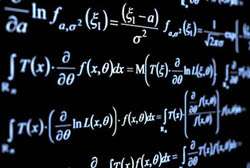Notre Dame psychologist developing new math learning strategies

What do children know about mathematics before they start learning it in school? How do external factors like language, education and culture affect children’s understanding? What is the best way to structure an environment so they have the building blocks needed for success in math?
These are just some of the questions Notre Dame psychologist Nicole McNeil seeks to answer in her research, for which she recently received a three-year, $565,000 grant from the Institute of Education Sciences (IES).
“The development of mathematical thinking presents a paradox,” says the Mary Hesburgh Flaherty and James F. Flaherty Assistant Professor of Psychology, whose scholarship focuses on cognitive development, specifically mathematical cognition.
“On one hand, young children and even infants have been shown to have a surprisingly sophisticated understanding of abstract math concepts,” she says. “On the other hand, math is a notoriously difficult subject to learn in school, with many children and adults failing to achieve basic competence.”
This is McNeil’s second IES award. In 2007, she received a four-year grant totaling more than $750,000 to determine whether modifications to traditional arithmetic practice could improve children’s understanding of mathematical equivalence.
The new funding will allow McNeil to build on what she learned during the first study in order to “develop and test a comprehensive intervention that is affordable, effective at producing mastery, and easy for teachers and parents to administer in schools, after-school programs and homes.”
Her goal, she says, is to create a program that has the potential to have “real and lasting benefits for children’s mathematical achievement and algebra readiness in the long term.”
To further support her work, McNeil has also recently been awarded a five-year CAREER grant from the National Science Foundation (NSF) worth approximately $750,000. CAREER grants are NSF’s “most prestigious awards in support of junior faculty who exemplify the role of teacher-scholars through outstanding research, excellent education, and the integration of education and research within the context of the mission of their organizations.”
As part of the NSF grant, McNeil will conduct a longitudinal study to see if a better understanding of math equivalence in the second grade leads to greater success in higher grades, especially algebra readiness in the sixth grade.
As an undergraduate, McNeil planned to become a doctor and was double majoring in chemistry and psychology at Carnegie Mellon University. One of her professors suggested she build her medical school application resume by working in a research lab on campus, and she found her way into one focused on cognitive development and communication.
“I developed a passion for cognitive development research—I couldn’t get enough of it—so I abandoned my idea of going to medical school and instead chose to pursue a Ph.D. in psychology,” she says.
Inspired by that experience, McNeil now challenges her students in the Department of Psychology to discover their own academic passions. She encourages them to find a “big question” that intrigues them and then works to provide the tools and guidance they need to pursue an answer.
“I feel strongly that students need to have one-on-one attention from faculty members,” McNeil says. “It gives them the opportunity to bounce ideas off and ask questions of an expert in the field. This type of intellectual discourse puts them in the position to eventually make a real contribution to the field.
“Students in my lab also get to be involved in every aspect of research, from conceptualization to dissemination.”
Through all this work on her own scholarly projects and with her students, McNeil hopes she can help parents and teachers determine the best ways to structure each child’s mathematical education so that all children can learn to be successful in school—and beyond.
Provided by University of Notre Dame

















